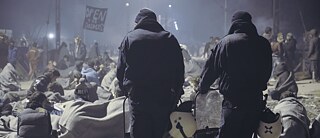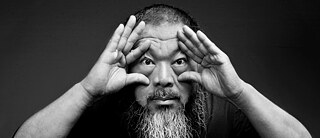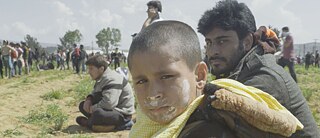Antenna Festival 2019
The Rest: From the human flow to the human toll

Making his second documentary on the topic in two years, Chinese-born, Berlin-based artist and activist Ai Weiwei explores the impact of the global refugee crisis across Europe, crafting a stirring on-the-ground plea for compassion.
By Sarah Ward
A raft sways in the water, the swish of the sea not only audible, but soothing. In the glistening blue sky above, as glimpsed over the vessel’s black walls, sunlight streams and gleams. This sight ranks among The Rest’s first images, but it’s far from idyllic. Rather, it’s a reminder of the cruel reality that faces refugees taking to the ocean in search of a better life. The film returns to other watery, sun-dappled visuals throughout its duration, always mindful of the heartbreak occurring en masse in such scenic surroundings - a situation that, in a civilised world, shouldn’t occur.
Interrogating the topic of immigration in his work again and again, Ai Weiwei has long made his affinity for the subject - and for those subjected to its rules, restrictions and whims - known. Based in Berlin between 2015-19, including while making both the German-funded The Rest and its predecessor Human Flow, the Chinese artist, activist and filmmaker is adrift himself.

CHRONICLING THE HUMAN TOLL
That opinion couldn’t reverberate more vigorously in The Rest, which dedicates its frames to showing not the human flow, but the human toll. Where Ai’s 2017 film was filled with snaking lines of asylum seekers trekking their way across the continent, navigating border checks and making the best they can of confined lives in squalid camps, its 2019 follow-up jumps between personal, often tearful accounts of death, destruction and widespread dismay. The documentary still captures new arrivals by boat, sifting through belongings, walking along the shore and being shepherd to processing sites, providing a broader view. During a tense standoff with the Macedonian army, Ai also spies the sprawling chaos of existence in such tenuous circumstances. But, largely taking a micro rather than macro perspective, he devotes the majority of The Rest to individual stories - such as the outpouring of grief from one man who lost 13 members of his family, including 10 children, to the sea. (In the aftermath of the tragedy, which was caused by a sinking, the smugglers he’d paid received a mere two-month sentence).Here, Ai is at his most scathing. “Human rights are finished all over the world,” another man offers, noting that the vast amount of global funding spent on weapons could surely make an impact in helping those displaced by constant warfare. Similar segments paint just as affecting a picture, including two in cemeteries where workers lament the piles of bodies, their increasing number, and the fact that the bulk belong to women and children. Surrounded by tents, another man can’t retain his calm as he recounts the bleak sights that he’s witnessed. “If I knew this, I would’ve stayed in Syria,” yet another explains. Elsewhere, mothers tell of fleeing bombs, petrified for their children, only to now sit in refugee camps.

APPEALING FOR COMPASSION
Ai isn’t a forceful presence in The Rest, or even seen, but he makes his point forcefully by letting those on the ground do the talking. An Italian priest speaks of receiving death threats for his kindly attitude towards refugees, while a traumatised man asks which religion’s god could possibly accept the experiences endured by the dislodged masses like himself. The movie’s aim isn’t to let anger fester, however. Rather, Ai is eager to elicit compassion for the people captured on film by his 12-strong cinematography team, and for the millions more like them. In his savviest move, he also acknowledges how easy it is to ignore the sheer size of the problem, all by honing in on one displaced young woman trying to reunite with her cat - knowing, as Hollywood filmmaking has for more than a century, that empathy flows far more freely for cute animals than suffering humans.Whether staring into refugees’ distraught eyes, chronicling the hostility around them or listening to their cries for help - and, in many cases, to go home instead of re-settling in Europe - The Rest is adroitly shot and assembled. Editor Wang Fen is particularly adept at splicing together a compelling story, with multitudes lingering within this documentary. Naturalism reigns supreme, both visually and in the film’s rhythm, because nothing else suits Ai’s purpose. Of course, art always involves seeing the world as it is - but here, to rousing effect, the Chinese director chooses to observe rather than interpret.
"The Rest" is screening twice at this year's Antenna Documentary Film Festival in Sydney. Tickets and times are available here.